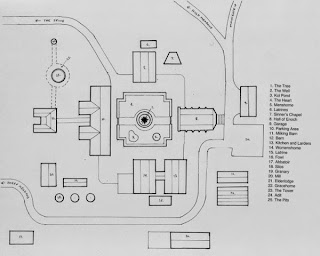First, a Fence
Pete Hautman
Twelve years ago I
was thinking about fences.
I’m fascinated by
fences. From the Great Wall of China to the wire rabbit fence protecting my
Swiss chard. I like their geometry, their simplicity, the opportunities for
self-indulgent metaphor.
I imagine a young
man, maybe seventeen or eighteen, with a wispy beard, walking along an eight
foot chain-link fence. Is the fence keeping him in, or keeping something out? I
don’t yet know. I see grasslands on both sides, rolling hills stretching to the
horizon. Looks like Montana.
I give the young
man a rifle because I’m worried about him. I don’t know if danger will come
from the other side of the fence, or from within, but I want him to be
prepared.
I look more
closely. He is young,
A cool breeze
moves the blades of amber grass to his left. Trees are visible ahead. Their
leaves have turned to shades of yellow, brown, and red. It must be autumn. I
hear the call of a bird. I make a note to research Montana trees and wildlife.
He is following a
worn footpath. Others have walked this fence line. On the other side the grass
is shorter, heavily grazed, probably by cattle. A faint smile shows through the
young man’s scant beard. Something is about to happen, but he doesn’t know it.
Will he need his rifle? Perhaps.
Some stories
begin with a plot. Some begin with a character, a conceit, or a message. Eden West began with the image of a
fence, and many unanswered questions. The world, the character, and the story grew
from there.
This is an
inefficient way to write a novel. It leads to wrong turns, blind alleys, and
dead ends. Eden West stalled out
several times. It took twelve years to finish.
The fence, I
discovered, surrounds Nodd, a twelve-square-mile compound in western Montana.
Within Nodd live the followers of Father Grace. They are awaiting the End of
Days. The young man, seventeen-year-old Jacob, was raised in Nodd.
I was pretty sure
I would find a story in Jacob’s world. There would be love, lust, faith,
betrayal, revelation, and redemption, because all stories should have those
things. Eventually I came to know my characters, their hopes and dreams, their
sins and failures. I learned about the fence.
I write for the
same reasons I read: to learn, to understand, to find out what happens next. Eden West turned out to be particularly
long journey. Sometimes I got lost, but I always found my way by returning to
the fence, where the story began.





No comments:
Post a Comment